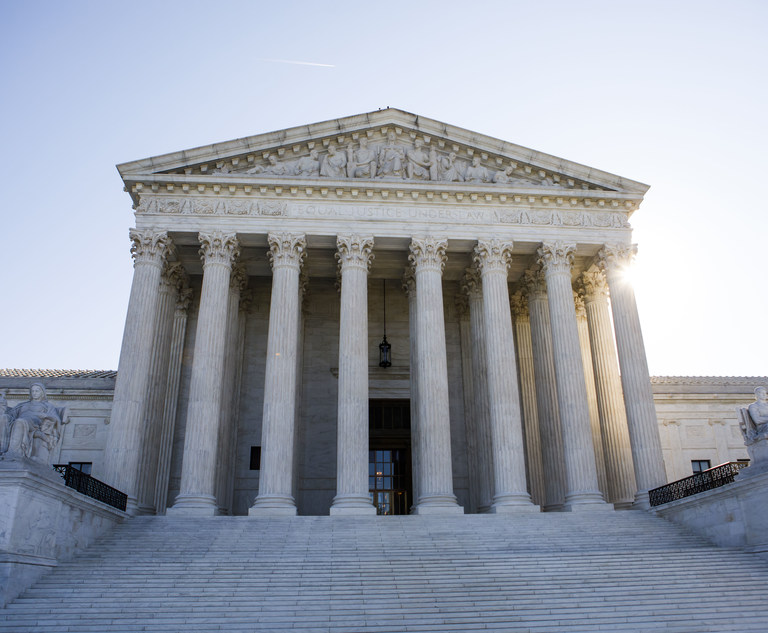 hoto: Diego M. Radzinschi/ALM.
hoto: Diego M. Radzinschi/ALM. Georgia PSC Elections Again Delayed After SCOTUS Ruling
The high court left open the possibility that the 11th Circuit could block U.S. District Judge Steven Grimberg's ruling and let the election go forward on other grounds. The 11th Circuit is also expected to consider a full appeal of the ruling later.
August 19, 2022 at 03:00 PM
4 minute read
Two Georgia Public Service Commission elections will not occur this November, the U.S. Supreme Court ruled Friday, reversing an earlier appeals court ruling that allowed them to proceed.
Instead, the high court reverted to the original decision by a federal judge in Atlanta that postponed the elections after finding that electing the five commissioners statewide illegally diluted Black votes.
District 2 Commissioner Tim Echols and District 3 Commissioner Fitz Johnson, both Republicans, are seeking reelection to six-year terms. Echols is being challenged by Democrat Patty Durand and Libertarian Colin McKinney, while Johnson faces Democrat Shelia Edwards.
The Supreme Court decision came hours after a state court judge in a separate case overturned a residency challenge to Durand and allowed her to stay on the ballot, ruling that new districts drawn earlier this year violated Durand's rights. Edwards also earlier won a residency challenge.
The Supreme Court ruled that U.S. District Judge Steven Grimberg's decision did not come too close to the election. The justices ruled that the 11th U.S. Circuit Court of Appeals was wrong to block Grimberg's order by citing an earlier Supreme Court decision saying judges shouldn't order changes close to elections.
Grimberg broke new ground in finding that statewide elections violate the Voting Rights Act, although his decision hinged on Georgia's decision of having candidates live in particular districts but run statewide. He found that illegally handicapped Black-favored candidates, and that such candidates would have a better chance of winning if only voters in a district voted on each candidate, making it possible to draw at least one Black-majority district.
Justices, in an unsigned one-paragraph order, wrote that the 11th Circuit was wrong to rely on that decision because Secretary of State Brad Raffensperger earlier told Grimberg that officials would have enough time to alter ballots if Grimberg ruled by Aug. 12. Justices found that because of that statement, Raffensperger had forfeited that argument.
The high court left open the possibility that the 11th Circuit could block Grimberg's ruling and let the election go forward on other grounds. The 11th Circuit is also expected to consider a full appeal of the ruling later.
Georgia Attorney General Chris Carr argues that Grimberg fundamentally erred in his decision by concluding that race and not Democratic partisanship drove defeats of candidates preferred by Black voters. He also says the judge overstepped in concluding that only state law and not the state constitution requires statewide elections. Grimberg earlier rejected both arguments.
Plaintiffs have said district elections would spotlight concerns of Black voters, including people with lower incomes who pay high utility bills. The lawsuit was brought by leaders of the NAACP, Georgia Conservation Voters and Black Voters Matter.
The commission regulates Georgia Power Co. and other utilities, determining how much companies are allowed to bill millions of ratepayers.
If Grimberg's ruling stands, state lawmakers would have to draw single-member districts for the commission.
Another federal judge earlier this year allowed Georgia's congressional elections to proceed even though he preliminarily found redistricting was likely to have illegally harmed Black voters. Voting rights advocates have decried decisions that prioritize allowing elections to go forward, saying they allow states to proceed with illegal elections. It also sparks fears that the Supreme Court will gut the Voting Rights Act section allowing people to sue over district lines and other voting provisions.
Georgia's Public Service Commission elections have been intensely litigated this year. Fulton County Superior Court Judge Melynee Leftridge ruled Thursday that Durand should stay on the ballot despite Raffensperger trying to kick her off for not meeting her district's one-year residency requirement.
Leftridge ruled that the requirement was not constitutional in Durand's case because she was targeted for exclusion during redistricting based on her residency.
The judge cited text messages between Echols and Public Service Commissioner Tricia Pridemore, who drew the districts that lawmakers adopted in March. Leftridge said evidence shows Pridemore had drawn a map that left Gwinnett County, where Durand previously lived, in District 2. But after Echols texted Durand's previous address to Pridemore, she drew a new map that excluded Gwinnett County from the district.
Durand moved to Conyers, part of the new District 2, but Raffensperger challenged her qualifications in April for not meeting the one-year residency requirement.
Leftridge ruled that the residency law, as applied, violated Durand's First Amendment right to free association and her 14th Amendment right to equal protection.
NOT FOR REPRINT
© 2025 ALM Global, LLC, All Rights Reserved. Request academic re-use from www.copyright.com. All other uses, submit a request to [email protected]. For more information visit Asset & Logo Licensing.
You Might Like
View All
Sanctions Order Over Toyota's Failure to Provide English Translations of Documents Vacated by Appeals Court
4 minute read
Second Circuit Upholds $5M Judgment Against Trump in E. Jean Carroll Case
4 minute read
'Paragraph V Displaced Lathrop': High Court Mulls Sovereign Immunity Waiver Disputes
7 minute read
11th Circuit Revives Project Veritas' Defamation Lawsuit Against CNN
Law Firms Mentioned
Trending Stories
- 1Court Rejects San Francisco's Challenge to Robotaxi Licenses
- 2'Be Prepared and Practice': Paul Hastings' Michelle Reed Breaks Down Firm's First SEC Cybersecurity Incident Disclosure Report
- 3Lina Khan Gives Up the Gavel After Contentious 4 Years as FTC Chair
- 4Allstate Is Using Cell Phone Data to Raise Prices, Attorney General Claims
- 5Epiq Announces AI Discovery Assistant, Initially Developed by Laer AI, With Help From Sullivan & Cromwell
Who Got The Work
J. Brugh Lower of Gibbons has entered an appearance for industrial equipment supplier Devco Corporation in a pending trademark infringement lawsuit. The suit, accusing the defendant of selling knock-off Graco products, was filed Dec. 18 in New Jersey District Court by Rivkin Radler on behalf of Graco Inc. and Graco Minnesota. The case, assigned to U.S. District Judge Zahid N. Quraishi, is 3:24-cv-11294, Graco Inc. et al v. Devco Corporation.
Who Got The Work
Rebecca Maller-Stein and Kent A. Yalowitz of Arnold & Porter Kaye Scholer have entered their appearances for Hanaco Venture Capital and its executives, Lior Prosor and David Frankel, in a pending securities lawsuit. The action, filed on Dec. 24 in New York Southern District Court by Zell, Aron & Co. on behalf of Goldeneye Advisors, accuses the defendants of negligently and fraudulently managing the plaintiff's $1 million investment. The case, assigned to U.S. District Judge Vernon S. Broderick, is 1:24-cv-09918, Goldeneye Advisors, LLC v. Hanaco Venture Capital, Ltd. et al.
Who Got The Work
Attorneys from A&O Shearman has stepped in as defense counsel for Toronto-Dominion Bank and other defendants in a pending securities class action. The suit, filed Dec. 11 in New York Southern District Court by Bleichmar Fonti & Auld, accuses the defendants of concealing the bank's 'pervasive' deficiencies in regards to its compliance with the Bank Secrecy Act and the quality of its anti-money laundering controls. The case, assigned to U.S. District Judge Arun Subramanian, is 1:24-cv-09445, Gonzalez v. The Toronto-Dominion Bank et al.
Who Got The Work
Crown Castle International, a Pennsylvania company providing shared communications infrastructure, has turned to Luke D. Wolf of Gordon Rees Scully Mansukhani to fend off a pending breach-of-contract lawsuit. The court action, filed Nov. 25 in Michigan Eastern District Court by Hooper Hathaway PC on behalf of The Town Residences LLC, accuses Crown Castle of failing to transfer approximately $30,000 in utility payments from T-Mobile in breach of a roof-top lease and assignment agreement. The case, assigned to U.S. District Judge Susan K. Declercq, is 2:24-cv-13131, The Town Residences LLC v. T-Mobile US, Inc. et al.
Who Got The Work
Wilfred P. Coronato and Daniel M. Schwartz of McCarter & English have stepped in as defense counsel to Electrolux Home Products Inc. in a pending product liability lawsuit. The court action, filed Nov. 26 in New York Eastern District Court by Poulos Lopiccolo PC and Nagel Rice LLP on behalf of David Stern, alleges that the defendant's refrigerators’ drawers and shelving repeatedly break and fall apart within months after purchase. The case, assigned to U.S. District Judge Joan M. Azrack, is 2:24-cv-08204, Stern v. Electrolux Home Products, Inc.






